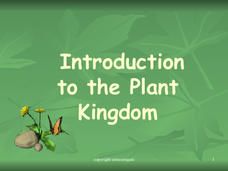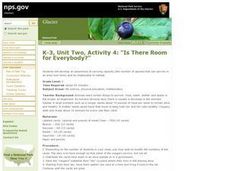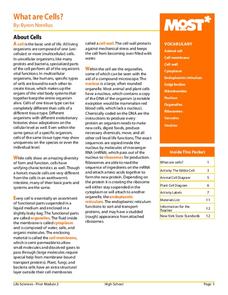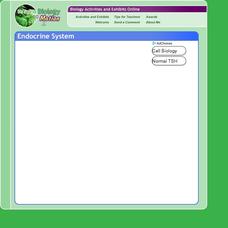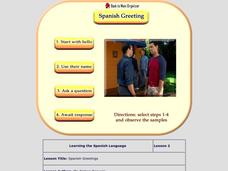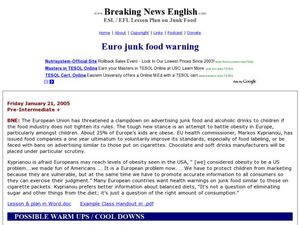Biology Junction
Introduction to the Plant Kingdom
Plants provide humans with food, shelter, and medications. Scholars gain a better appreciation for plants after learning their functions, divisions, and early ancestors. Each sub-topic includes slides highlighting vocabulary and...
Curated OER
The Amazing Ant
Students explain that ants are an important element of nature's balance. Ants eat many insects and are food to other animals. They watch a video and conduct hands-on activities that give them an excellent overview of the ants role in...
Curated OER
Is There Room for Everybody?
Third graders examine the capacity of animals able to live in one habitat. In this habitat lesson plan, 3rd graders play a game that shows the food chain and the interactions between animals in an area. Students discover that food is a...
Curated OER
Rates of Reactions end Enzymes
Introducing enzymes and the controlling factors of a reaction this slideshow displays the typical rate of reaction graph and labels the main sections. The summaries of ways to measure reaction rates are valuable and the examples of...
Curated OER
What Are Cells?
Energize the cells of young biologists with an edible life science activity. Engaging students in exploring the inner workings of plant and animal cells, this activity involves using colored jello and various sweet and...
Desert Discovery
Saguaro Parts
Young biologists identify the basic structures of a saguaro cactus. They study the functions of each of the structures, and label them on a picture of a saguaro cactus embedded in the plan. This simple, and easy-to-implement...
Curated OER
Cellular Respiration
Students are often confused by the huge amount of information and detail that can be learned about respiration. This is a great presentation summarizing the main 4 stages of cellular respiration. It is clear and uses diagrams and...
Curated OER
Animal Nutrition, Variations, Adaptations & Regulation
Information about digestion of various food components is given in this PowerPoint. The diets of herbivores and carnivores are compared, and there are many diagrams giving details of their digestive system specializations. The...
National Wildlife Federation
Massive Migrations
Turn your students into flocks of migratory birds for this fun activity on animal migration. Prior to the activity, the teacher creates four different migration routes in the classroom or any available open space, labeling nesting...
Serendip
Using Models to Understand Cellular Respiration
Energize biologists with colorful images in an activity that captivates the imagination while demystifying the subject of cellular respiration. Participants build comprehension skills and access core content knowledge by analyzing text...
Curated OER
Regulating the Internal Environment
This presentation begins with the many problems multicellular organisms which rely on diffusion encounter. There are many diagrams of mammalian organ structures, and they are labelled with their relevant functions. This an excellent...
Curated OER
Culture, Race & Ethnicity
Is there a difference between culture, race, and ethnicity? In order to celebrate Harmony Day and cultural diversity, your class will brainstorm, discuss, and discover that there is. The class splits into three groups, each group is...
It's About Time
Organic Substances
Host an exciting lab in which learners burn fruit rinds to better understand hydrocarbons. A reading passage and analysis questions wrap up the lesson.
Science Geek
Basic Biochemistry - Carbohydrate, Protein and Fat
You are what you eat, right down to your molecular structure. A hearty presentation begins with the two types of carbohydrates, simple and complex. Then it details proteins and amino acids. It ends by reviewing the three types of...
Biology in Motion
Thyroid Gland and Negative Feedback
Many glands work together to control hormone levels in the body. The interactive focuses on the thyroid gland, pituitary gland, and the hypothalamus. It demonstrates the interconnections and feedback loops present in the endocrine system.
Curated OER
Semipermeable Membranes and Bioaccumulation
Beginning biologists place a drop of food coloring into water of differing temperatures to observe the effect on the diffusion rate. They remove the shells from raw eggs and then experiment with osmosis over the remaining membranes....
Curated OER
Reading Practice: Winnie-the-Pooh
Whether your first graders can read or not, they will enjoy this comprehension activity. They read or listen to an excerpt from a Winnie-the-Pooh story, they predict what will happen next, then draw Pooh Bear's favorite food. A compare...
Curated OER
Lesson 2- Spanish Greeting
Break down a quick conversation in Spanish. After the teacher presents the vocabulary, the class heads to the computer lab, where class members can watch a brief interactive video. The visual is one clip separated into four clearly...
NOAA
Deep-Sea Ecosystems – Chemosynthesis for the Classroom
Photosynthesis was discovered in the 1770s, but chemosynthesis wasn't discovered until 1977. While many have performed an experiment to show how photosynthesis works, the activity allows pupils to observe chemosynthesis. Scholars set up...
Science Matters
Ring of Fire
Over a period of 35 years, earthquakes and volcanoes combined only accounted for 1.5 percent of the deaths from natural disasters in the United States. The 15th lesson in a 20-part series connects the locations of earthquakes and...
Curated OER
Nutrition
Student analyze pictures of food items to determine which of the six food pyramid groups they belong to. They tape the pictures onto a poster of the food pyramid. Upon completing the food pyramid, they draw balance meals on paper plates...
Curated OER
Healthy Choice Shopping Frenzy
Students identify the four food groups. In this food pyramid lesson. students use pictures of food to determine what food group they belong to. Foods that are placed in the wrong place are discussed.
Curated OER
Eat Right!
Students discuss the food pyramid. They create healthy meals using the food pyramid.
Curated OER
Breaking News English: Euro Junk Food Warning
In this English worksheet, students read "Euro Junk Food Warning," and then respond to 47 fill in the blank, 7 short answer, 20 matching, and 8 true or false questions about the selection.
